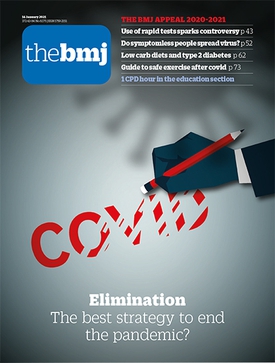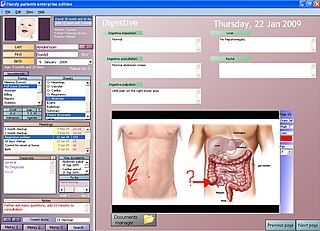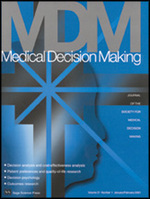
Health informatics is the study and implementation of computer structures and algorithms to improve communication, understanding, and management of medical information. It can be viewed as a branch of engineering and applied science.
BioMed Central (BMC) is a United Kingdom-based, for-profit scientific open access publisher that produces over 250 scientific journals. All its journals are published online only. BioMed Central describes itself as the first and largest open access science publisher. It was founded in 2000 and has been owned by Springer, now Springer Nature, since 2008.

The BMJ is a weekly peer-reviewed medical journal, published by BMJ Group, which in turn is wholly-owned by the British Medical Association (BMA). The BMJ has editorial freedom from the BMA. It is one of the world's oldest general medical journals. Previously called the British Medical Journal, the title was officially shortened to BMJ in 1988, and then changed to The BMJ in 2014. The journal is published by BMJ Publishing Group Ltd, a subsidiary of the British Medical Association (BMA). The current editor-in-chief of The BMJ is Kamran Abbasi, who was appointed in January 2022.

An electronic health record (EHR) is the systematized collection of patient and population electronically stored health information in a digital format. These records can be shared across different health care settings. Records are shared through network-connected, enterprise-wide information systems or other information networks and exchanges. EHRs may include a range of data, including demographics, medical history, medication and allergies, immunization status, laboratory test results, radiology images, vital signs, personal statistics like age and weight, and billing information.
A clinical decision support system (CDSS) is a health information technology that provides clinicians, staff, patients, and other individuals with knowledge and person-specific information to help health and health care. CDSS encompasses a variety of tools to enhance decision-making in the clinical workflow. These tools include computerized alerts and reminders to care providers and patients, clinical guidelines, condition-specific order sets, focused patient data reports and summaries, documentation templates, diagnostic support, and contextually relevant reference information, among other tools. CDSSs constitute a major topic in artificial intelligence in medicine.
Vimla Lodhia Patel is a Fijian-born Canadian cognitive psychologist and biomedical informaticist.

Yves A. Lussier is a physician-scientist conducting research in Precision medicine, Translational bioinformatics and Personal Genomics. As a co-founder of Purkinje, he pioneered the commercial use of controlled medical vocabulary organized as directed semantic networks in electronic medical records, as well as Pen computing for clinicians.
BMC Medicine is a peer-reviewed open access medical journal published since 2003 by BioMed Central.
Decision aids are interventions or tools designed to facilitate shared decision making and patient participation in health care decisions.

Medical Decision Making is a peer-reviewed academic journal that publishes papers in the fields of decision-making and medical informatics. Its editor-in-chief is Brian Zikmund-Fisher. It was established in 1981 and is currently published by SAGE Publications on behalf of the Society for Medical Decision Making. A sister open access journal focusing on applications of medical decision making, Medical Decision Making Policy & Practice, began publishing in 2016.
Translational bioinformatics (TBI) is a field that emerged in the 2010s to study health informatics, focused on the convergence of molecular bioinformatics, biostatistics, statistical genetics and clinical informatics. Its focus is on applying informatics methodology to the increasing amount of biomedical and genomic data to formulate knowledge and medical tools, which can be utilized by scientists, clinicians, and patients. Furthermore, it involves applying biomedical research to improve human health through the use of computer-based information system. TBI employs data mining and analyzing biomedical informatics in order to generate clinical knowledge for application. Clinical knowledge includes finding similarities in patient populations, interpreting biological information to suggest therapy treatments and predict health outcomes.

The International Conference on Computational Intelligence Methods for Bioinformatics and Biostatistics (CIBB) is a yearly scientific conference focused on machine learning and computational intelligence applied to bioinformatics, biostatistics, and medical informatics.
Annals of the Royal College of Surgeons of England is a medical journal published eight times a year by the College, in January, March, April, May, July, September, October and November. The sister journal of the Annals is the Bulletin of the Royal College of Surgeons of England.

Health information on the Internet refers to all health-related information communicated through or available on the Internet.
In medicine, implementability is a property of clinical practice guidelines. It refers to a set of characteristics that predict ease of guideline adaptations by clinicians. There is a journal Implementation Science, which "aims to publish research relevant to the scientific study of methods to promote the uptake of research findings into routine healthcare in clinical, organisational or policy contexts".
Biomedical data science is a multidisciplinary field which leverages large volumes of data to promote biomedical innovation and discovery. Biomedical data science draws from various fields including Biostatistics, Biomedical informatics, and machine learning, with the goal of understanding biological and medical data. It can be viewed as the study and application of data science to solve biomedical problems. Modern biomedical datasets often have specific features which make their analyses difficult, including:
Mirta Galesic is a Croatian American psychologist who is the Cowan Chair in Human Social Dynamics at the Santa Fe Institute. She serves as a member of the faculty at the Complexity Science Hub Vienna.
James R. Langabeer II is an American decision scientist, academic, and entrepreneur known for his theories on strategy and decision-making. He is the Robert H. Graham Professor of Entrepreneurial Biomedical Informatics and Bioengineering at The University of Texas Health Science Center at Houston, and maintains faculty appointments in the department of Emergency Medicine and Psychiatry.
Lisa J. M. Caldon is a British professor and clinical lecturer specialising in oncology. In her 20 year career, Caldon has published some 20 papers in the field of medicine. These have appeared in some of the top medical and peer-reviewed journals in Britain and abroad, including Medical Education, the European Journal of Cancer, the British Journal of Surgery, Patient Education and Counseling, Psycho-Oncology, Future Oncology, BMC Medical Informatics and Decision Making, and The Lancet Oncology. Caldon has worked at The University of Sheffield and with Cancer Research UK.






